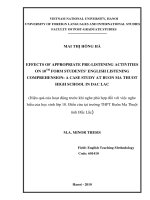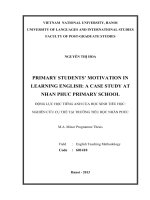Case study 5 SHRM AT MEGASTORES
Bạn đang xem bản rút gọn của tài liệu. Xem và tải ngay bản đầy đủ của tài liệu tại đây (60.69 KB, 3 trang )
Case Study 5. Strategic Human Resource Management
SHRM AT MEGASTORES
The case
Megastores is one of the country's largest and most successful high street retailers. It has a
very powerful overriding commercial objective – to increase shareholders’ value – and to do
this by providing value-for-money products and delivering consistently high levels of
customer service.
Business strategy
The Managing Director made the following observations about strategic management:
Strategy is developing a route to better the business in the medium to long term. You
cannot fully maximize the business opportunities unless you've got the proper
management structure to create them. In business you have to look at the options
available, make a decision and then drive that way.
The approach to strategy formulation was described by the Director of Finance as follows:
Our strategy tends to be based on the resolution of issues. There is a base strategy and
we continue to question whether that is the right thing to be going forward with. We
have a strategic planning framework throughout the group. It's called value-based
management (VBM), the fundamentals of which are to make sure that whatever you do,
you must maximize shareholder value… It provides us with a basis for looking at what
we are doing and the resources we require we've never had before.
He also commented, however, that:
We're highly profitable, but in turn we invest an awful lot in our people. We spend a lot
of money on the training and development of people throughout the organization. It's
probably one of our key differentiators.
The Director of Stores gave these perspectives on the strategic planning process:
We have in place a formal business planning process in which we divide the planning
into three levels. One is at business level, where we identify issues that we deal with as
a company; the second level is product-market planning; and the third level is local
market planning.
Our business strategy is formed through value-based management, which is a
discipline for pulling everything together and ensures that decisions are made on the
basis of their real value to the business rather than someone's strength of personality or
hunch. This in itself required the involvement of all the directors in a more formal
business planning process. Three or four years ago we worked more individually and
now we work more as a team.
There are elements of our business that are incredibly value-creating. There are
others that are incredibly value-destroying. The trick is to identify the ones that are
value creating and funnel resources to them.
There are a number of blocks that make up our business strategy. The first is our
overall objective. Against this we spin off a number of elements we call major initiatives.
These are coordinated by our Director of Corporate Planning, but it is the functional
directors who are really charged with taking ownership of these objectives.
HR strategy
The comments made by the Managing Director on the formulation of HR strategy are given
below:
The biggest challenge will be to maintain (our) competitive advantage and to do that we
need to maintain and continue to attract very high calibre people.
All we do in terms of training and human resource planning is directly linked to
business improvement.
The key differentiator on anything any company does is fundamentally the people,
and I think that people tend to forget that they are the most important asset. Money is
easy to get hold of; good people are not.
The influence in terms of strategic direction must always be based on the key areas of
marketing and operations.
When questioned on his approach to the development of HR strategies the HR Director
replied:
I start with the top line, the four or five things which are the strategic platform for the
company. I get my managers together to look at the implications. We then pull it
together so that it is all derived from the original strategic platforms and then work topdown and bottom-up to get the amalgam of what we can achieve. This then feeds into
the final operating plan so we can agree budgets.
The task
What do the quotes given in the case study tell us about the process of developing and
integrating HR strategy in general and the achievement of fit between the business and HR
strategy?
Comment
This case is another example of how ‘fit’ is achieved in the development of HR strategy.
Consideration needs to be given to the types of fit identified by academic commentators
such as Delery and Doty (1996), Schuler and Jackson (1987) and David Guest (1997),
namely: 1) external fit: HRM as strategic integration; 2) internal fit: HRM as a set of ideal
practices; 3) configurational fit: HRM as bundles.
Further reading in Armstrong’s Handbook of Human Resource Management Practice:
Chapter 7.









